By Ashley Preen
June 9, 2021
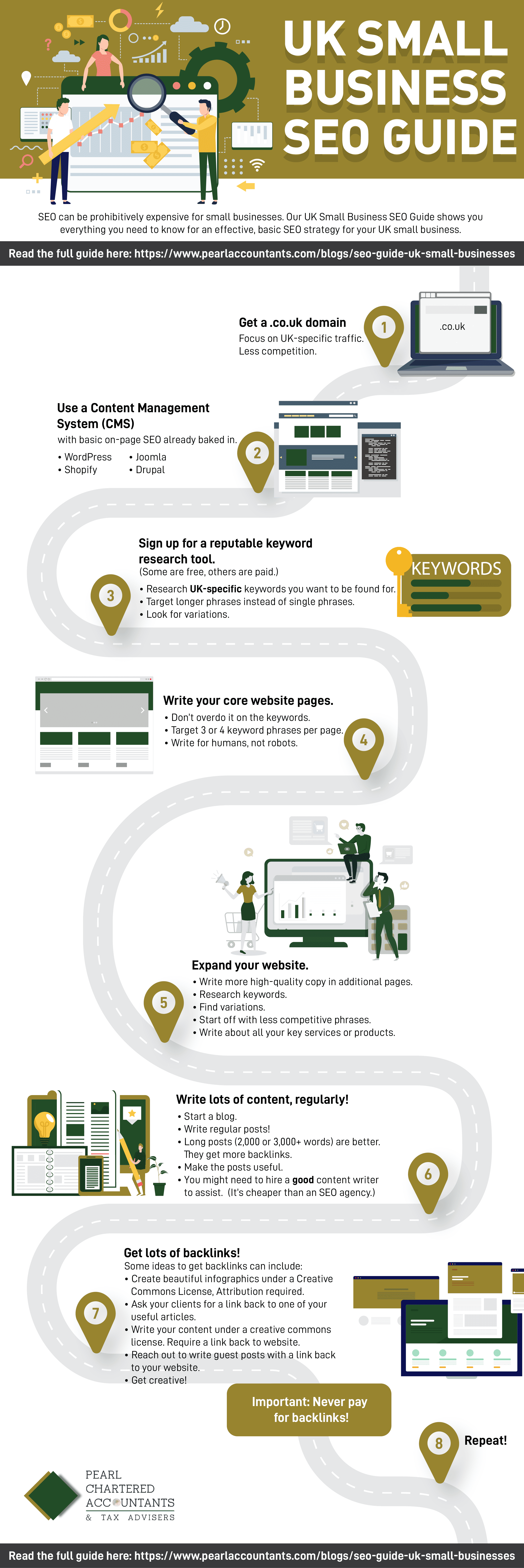
SEO has taken on almost mythical status in the minds of many. It is often considered the one-shot marketing solution to bring a business prosperity in this digital age.
As e-commerce accountants, we see our fair share of UK SEO marketing budgets. But not only e-commerce businesses spend money on SEO in the UK. We have seen SEO budgets for freelancers, small businesses, landlords, and many other types of businesses.
We also see many companies that have a DIY strategy for SEO.
We also do a fair amount of SEO in our accountancy practice. And our forward-thinking approach to technology has merited us a position as a finalist for the Intuit Global Firm of the Future Award.
What follows is a comprehensive guide of what we know works when doing SEO specifically for small businesses based in the UK.
The UK and other English-speaking countries have the disadvantage of competing in the English language. English is by far the widest used language on the internet, making up a staggering 60.4 per cent of the world’s top 10M websites.

The second-most-used language (Russian) doesn’t even come close to that number with only 8.5 per cent of the top websites being written in Russian.
For this reason, when competing on an international scale, English-speaking countries such as the UK, Australia, New Zealand, South Africa, etc. have a distinct disadvantage when attempting to reach a global audience.
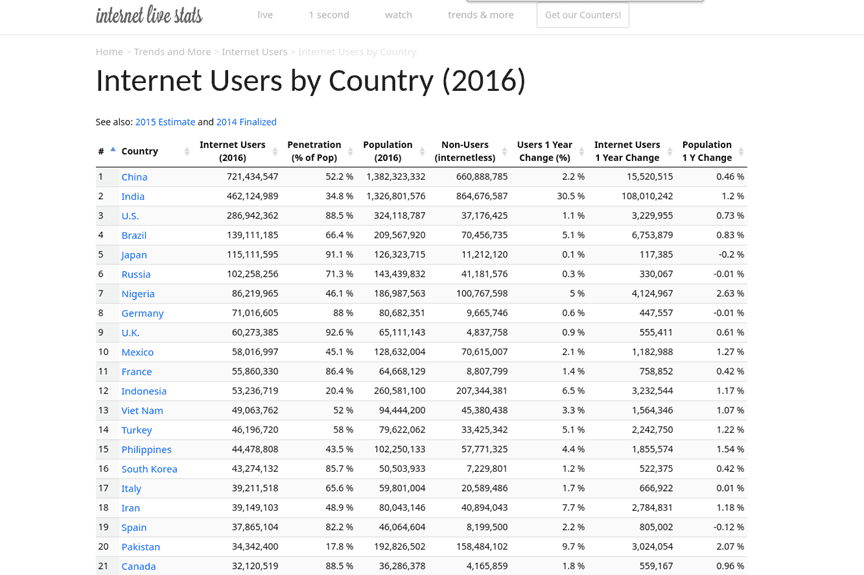
At the same time, the UK has an advantage in other respects—when you’re targeting UK-specific services, you have far less competition to get to the Number One spot on the search engines compared to the USA. The sheer number of internet users and websites in the USA dwarfs the UK’s amount by many times.
In that respect, the first thing a small UK business needs to know about SEO is that it should focus on local traffic. Minimally, that means owning a .co.uk domain for your business instead of a .com domain.
Dotcom domains are considered “international” domains. But utilising country-specific codes is a crucial signal to search engines, to let them know that the content on your site is specific to that country.
These “endings” in domains (.com, .co.uk, .net, etc.) are called “Top-Level Domains” (TLDs), and country-specific ones are called “Country-Code Top-Level Domains” or ccTLDs.

Sure, if you’re a mega-sized corporation, you can probably afford the mammoth budget required to compete on a global SEO scale and stick only with your .com domain. But, for small businesses in the UK, it’s easiest to target local traffic and to get a .co.uk domain to let the search engines know that your website is specific to people in the UK.
SEO agencies tend to be expensive. A fully-fledged SEO service can provide ROI by the bucketload if your business is large enough to reap the benefits through commensurate sales.
Let’s say you get a quote for £20,000/month SEO services by an agency (the top SEO agencies will rarely charge less than £10,000/month for the full SEO service). That’s £240,000 a year! Would the SEO gains that agency gives you add up to at least £240,000 a year? If you’re selling products of only a few quid a piece, it’s unlikely you’ll make that kind of return.
So, paying for an SEO agency can be a bit of a risk if you’re small.
For larger companies, well, it might be an option.
The good news is that learning the essentials of SEO is easy. It does take some work, and the biggest problem many small UK businesses have is finding the time to do it all.
But the question comes down to ROI. And, in that case, we can offer a simple calculation to establish if doing SEO in your small UK business is worth it.
Taking the insights from this article in Forbes, we see that the Number One position on Google brought one agency a 36% click-through rate. (The “click-through rate” is the percentage of people who click a link compared to the number of times it has been shown. So, if your site appears 100 times in the search engines and it gets 20 clicks, then it has a 20% CTR, or click-through rate.)
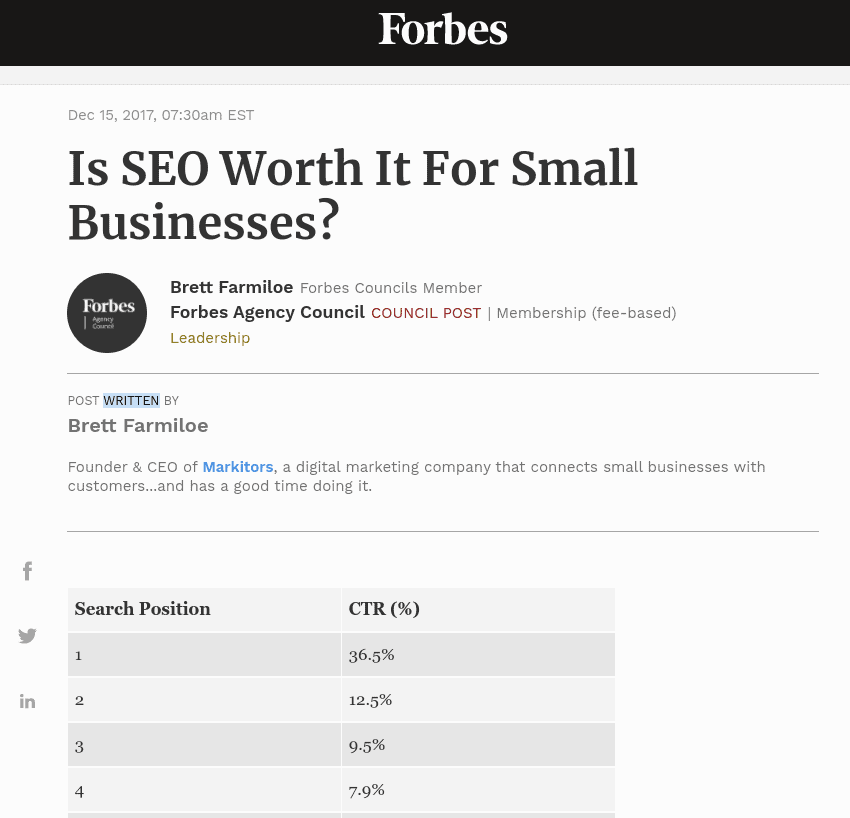
The second metric to understand is conversion rate. Crudely defined, that’s the number of people who buy something from your website compared to the number of visitors it had. So, if 1,000 people visited your website and 20 of them bought something, that’s a 2% conversion rate.
Using those numbers, we can work out mathematically if online advertising or SEO is the better option for you. (Or, even, if paid SEO versus DIY-SEO is the way for you to go.)
Let’s assume you did your UK SEO right, and your website is appearing 1,000 times a month in position #1 on the Search Engines. At 36% CTR, that’s 360 visits a month. Let’s imagine your average conversion is worth £500. So, at a 2% conversion rate, that’s seven sales of an average of £500 each—or £42,000 per annum.
Immediately, we can see that a fee of £10,000 for SEO services (£120,000 per annum) would not be worth it. But DIY SEO would almost certainly cost less than £42,000 of investment per year.
But what about paid advertising? Well, let’s assume you pay an average of £3.00 per click (a somewhat low estimate if you’re targeting London, but let’s be generous for the sake of this article). For the same 360 visits, you’d be paying £1,080.
That means you’d still be making a profit if you used online advertising, and your yearly return would be £42,000 – £12,960 = £29,040.
But online advertising is likewise time-consuming.
And the numbers we used above might be on the high side. If we reduce the average conversion value to £50, then we’re down to £4,200 in earnings per year, and you’d be in the red if you had gone the advertising route!
Whether SEO is worth it for you depends on:
These are things each individual business must answer for themselves.
Another thing to keep in mind is that SEO benefits are long-term. Whereas paid advertising comes to an end the moment you stop paying for your ad to appear in the search results, well-done SEO means your site can stay in the search engines for years to come without you having to lift another finger.

Part of ensuring your SEO efforts last as long as possible is to create “evergreen” content for your website (content that stays relevant even years after it was written).
Evergreen content is content that stays relevant years after it has been completed.
There’s nothing to lose with embarking on a DIY SEO strategy for your business, and everything to gain.
Doing good SEO for your website will benefit your business’s web presence in the long term, whereas jumping in and paying for advertising is transient. (And it affects your bank account.)
The place to start with SEO is to ensure you have a website that complies with all the essential needs for good SEO. This is called “on-page” SEO.
On-page SEO differs from off-page SEO in that on-page SEO covers the actions you must take directly on your website to improve its chances of getting found on the search engines. (Off-page SEO includes promotions, ads, guest blogs, etc. that can encourage people to link to your website from their own websites.)
On-page SEO covers several advanced topics that you don’t need to know anything about to implement. The reason for this is that a lot of the popular website-building platforms already take care of this automatically for you.
These things include:
So, the place to start for great SEO is with a website system that already includes all of the above elements automatically so you don’t have to hire someone specifically to take care of all of it.

The most popular system out there which does this is, by far, WordPress. (This is likely fueled by the fact that WordPress is free.) This is followed by Shopify which is aimed specifically at e-commerce websites. (Shopify is not free, although it is easier to set up than WordPress.)
By going with one of these two systems (or others such as Joomla or Drupal), you all but guarantee that your basic SEO will be taken care of.
WordPress also has some popular plugins that help newcomers with some of the more complicated aspects of on-page SEO. One such plugin is called RankMath, and it’s free. By simply following the instructions provided by this plugin, you’ll go a long way to getting in your basics for SEO.

Rank Math SEO is a popular WordPress SEO plugin and is completely free.
Other popular SEO plugins include Yoast, All-In-One SEO Pack, and SEOPress. Not all of these are free.
But, if this was all that was needed for great UK SEO, then every website that ran WordPress and used some SEO plugins would rank tops on the search engines, right?
Well, as you might have noticed, that is not the case. You need a complete SEO strategy for your UK business, and you have to work on it constantly. Below is our recommended strategy for small UK businesses that don’t have a huge budget to spend on SEO.
Above all else, get a .co.uk domain! This is the first and foremost thing to do to increase your small business’s chances of being found in the UK.
If you already have a .com, .net or any other domain, you can set up an automatic redirection from this domain to your .co.uk domain. Your web host would be able to help you with this.
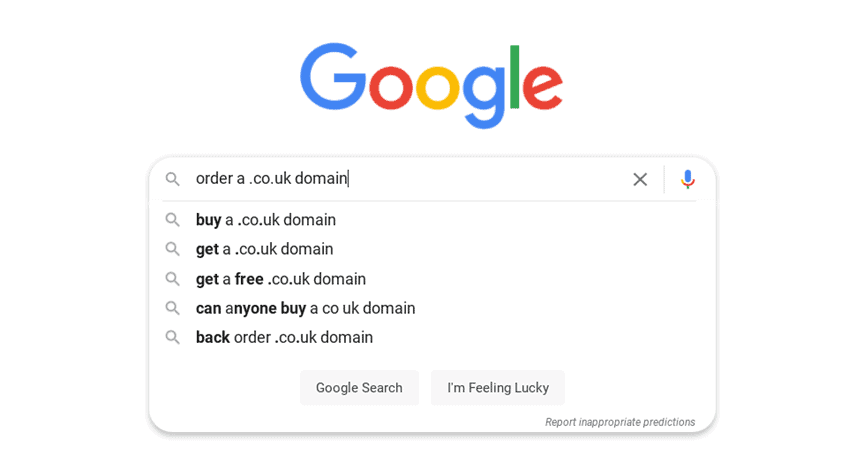
A “CMS” or Content Management System is a website that makes it easy for you to manage your content—text, images, video, etc—without having to know any programming.
WordPress is free but it’s a DIY solution so you need to know a bit about setting up websites to get it set up properly. (Having said that, many hosts these days offer an automatic installation of WordPress with just the click of a button.)
WordPress also offers a paid solution where they set up the website for you.

The paid version of WordPress limits the types of plugins you are allowed to install, but that’s because the DIY WordPress is brutally notorious for being a hacker’s preferred meal.
Great! You’ve got a UK-specific domain name and a website. Now what?
Content, of course!
But not just any content. You need targeted content that utilises the keywords that you want to be found for.
This is a large subject which you can always keep learning more about. But for a starter’s guide, this is the most important thing you need to know:
That last point is crucial. There are several keyword tools around, some of them paid and others fairly pricey. Depending on your budget, you could have a look at:
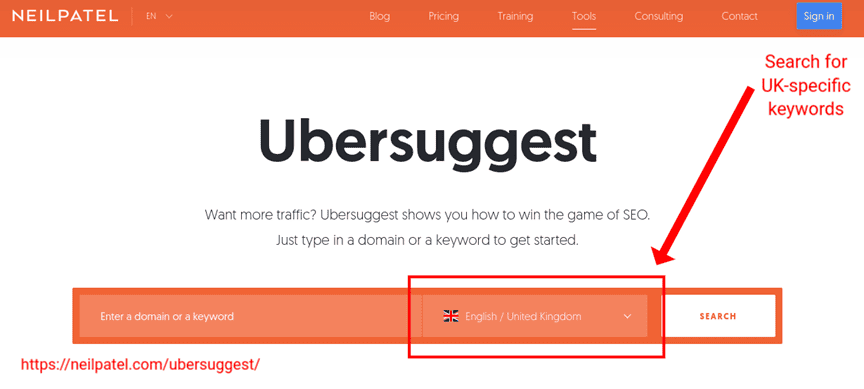
Some of the tools mentioned above offer additional SEO tools which can provide plenty of insight for newcomers and SEO veterans alike.
Important: When searching for your keywords, play around with UK-specific phrases and words. Also, add “UK” to the search query and see what comes up. As a UK small business, this is where you can have the upper hand. Let the big brands get the gazillions of visitors to their international stores. The smallest slice of that traffic would have your small business in clover. So, take that slice in the form of UK-specific keywords. You could even target a specific location in the UK if you wanted to!
Don’t get too hung up on the content for your core website pages. The real work on content comes about in the form of regular blogs and additional pages which target a specific keyword.
Just make sure the main pages have your core keywords and that the pages are well written.
Be sure to use “UK” as a word in the copy of the page. If you’re a baker, don’t just call yourself a baker. Call yourself “Made-in-the-UK Baker” or “The UK’s Favourite Baker”.
Okay, now is where the fun really starts.
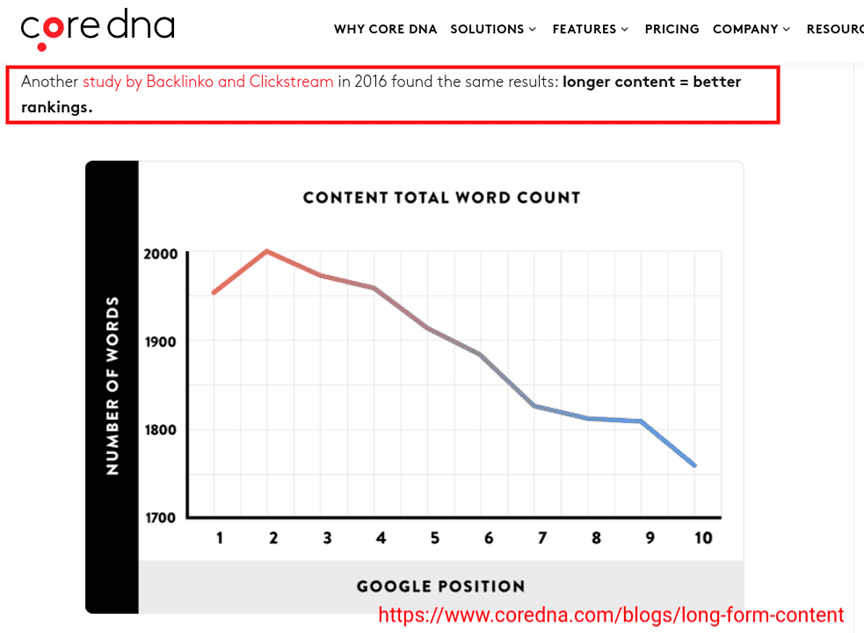
You need to write regularly. You basically do the same exercise you did above with the keyword research, but now you’re doing it for regular content, i.e., blog posts
These blog posts should be at least 800 words long. Although, for the best SEO juice, you should try writing them at about 2,000+ words, or even 3,000+!
Also, long pieces tend to get more “backlinks”, which is the number of links your website gets from other sites.
And backlinks from high-ranking websites is the secret of secrets for good SEO! WHich brings us to our final step for excellent UK SEO:
This is the secret juice to SEO, and we are now into off-page SEO.
This is a really in-depth subject but here are the essential elements to know:
There are a number of ways to ask for backlinks. Here are just a few ideas:
One important thing to know, however, is that you shouldn’t pay for links to your site. This could get you penalised by search engines.
SEO is long-term work. But if you repeat, repeat, repeat the above actions diligently, ensuring you are always creating high-quality content, it is almost guaranteed that your UK-specific traffic will start picking up.
At the very least, you’ll have a great website that your clients and leads are happy to visit and use. And that can lead directly to sales.
It’s true: SEO is a lot of hard work. This hard work tends to justify some agencies’ fees (so long as they deliver the goods).
But you can do the work yourself in your small UK business so long as you know the basics.